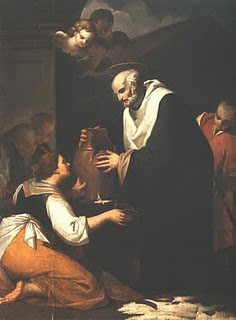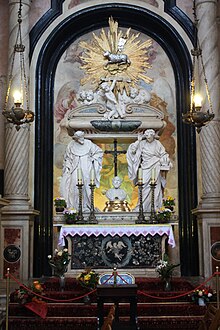
Feastday: December 23
The people of Olkusz in Bohemia in 1431 had every reason to be suspicious of their new pastor. They knew what a Cracow professor would think of their small rural town. But even more insulting, their town was once again being used as a dumping ground for a priest who was "in disgrace."
John had indeed been kicked out of his university position -- unjustly. Rivals who resented John's popularity with the students had cooked up a false charge against him. John was not even allowed to appear at his own hearing or testify in his own defense. So at age 41, he was shipped off to be an apprentice pastor.
Certainly no one would have blamed John if he was furious at such injustice. However, he was determined that his new parishioners would not suffer because of what he happened to him.
But there was no overnight miracle waiting of him in Olkusz. He was nervous and afraid of his new responsibilities. And, despite the energy he put into his new job, the parishioners remained hostile. But John's plan was very simple, and came not from the mind but from the heart. He let his genuine interest and concern for these people show in everything he did. Despite working for years without any sign of success, he was very careful not to demonstrate impatience or anger. He knew that people could never be bullied into love, so he gave them what he hoped they would find in themselves.
After eight years, he was exonerated and transferred back to Cracow. He had been so successful that these once-hostile people followed him several miles down the road, begging him to stay.
For the rest of his life, he was professor of sacred Scripture at the university. He was so well-liked that he was often invited to dinner with nobility. Once, he was turned away at the door by a servant who thought John's cassock was too frayed. John didn't argue but went home, changed into a new cassock, and returned. During the meal, a servant spilled a dish on John's new clothes. "No matter," he joked. "My clothes deserve some dinner, too. If it hadn't been for them I wouldn't be here at all."
Once John was sitting down to dinner when he saw a beggar walk by outside. He jumped up immediately, ran out, and gave the beggar the food in his bowl. He asked no questions, made no demands. He just saw someone in need and helped with what he had.
John taught his students this philosophy again and again, "Fight all error, but do it with good humor, patience, kindness, and love. Harshness will damage your own soul and spoil the best cause."
In His Footsteps:John put all his effort into a new and frightening job, that others might have considered beneath him. Today do something you have never done before or do something in a new way, perhaps something that has frightened you or you felt was beneath you. This can be something as simple as trying a different type of prayer or as complex as serving others in a new way.
Prayer:Saint John of Kanty, you were unjustly fired from your work. Please pray for those who are jobless or in danger of losing their jobs that they may find work that is fulfilling in every way. Guide us to ways to help those looking for work. Amen
Polish priest, scholastic philosopher, physicist and theologian This article is about the saint and theologian. For the inventor, see John Kanzius. For the American inventor, see John Cantius Garand. Tomb of Saint John Cantius.
Tomb of Saint John Cantius.Church of St. Anne, Kraków, Poland.
John Cantius (Latin: Joannes Cantius, Polish: Jan z Kęt or Jan Kanty; 23 June 1390 – 24 December 1473) was a Polish priest, scholastic philosopher, physicist and theologian.
Biography
John Cantius was born in Kęty, a small town near Oświęcim, Poland, to Stanisław and Anna Kanty. He attended the Kraków Academy at which he attained bachelor, and licentiate. In 1418 he became a Doctor of Philosophy. Upon graduation he spent the next three years conducting philosophy classes at the university, while preparing for the priesthood.
Upon his ordination, he became rector at the school of the Canons Regular of the Most Holy Sepulcher in Miechow. While there, he was offered a professorship of Sacra Scriptura (Sacred Scripture) back at his alma mater, the Kraków Academy, which would later be named the Jagiellonian University. He attained a doctorate in theology and eventually became director of the theology department. He held the professorship until his death in 1473. Cantius spent many hours copying manuscripts of the Holy Scriptures, theological tracts, and other scholarly works.
In physics, he helped develop Jean Buridan's theory of impetus, which anticipated the work of Galileo and Newton.
During his time in Kraków, Cantius became well known in the city for his generosity and compassion toward the poor, especially needy students at the university. He subsisted on what was strictly necessary to sustain his life, giving alms regularly to the poor. He made one pilgrimage to Jerusalem and four pilgrimages on foot to Rome.
Michael Miechowita, the medieval Polish historian and Cantius's first biographer, described Cantius's extreme humility and charity; he took as his motto:
- Conturbare cave: non est placare suave,
- Infamare cave; nam revocare grave.
- (Beware disturbing: it's not sweetly pleasing,
- Beware speaking ill: for taking back words is burdensome.)
He died while living in retirement at his alma mater on 24 December 1473, aged 83. His remains were interred in the Collegiate Church of St Anne, where his tomb became and remains a popular pilgrimage site. He is the patron of the diocese of Bielsko-Żywiec (since 1992), and of the students.
Veneration
John Cantius was beatified in Rome by Pope Clement X on 28 March 1676. He was named patron of Poland and Lithuania by Pope Clement XII in the year 1737. Ninety-one years after his beatification, John Cantius was canonized on 16 July 1767, by Pope Clement XIII.
The Roman Breviary distinguishes him with three hymns; he is the only confessor not a bishop who has been given this honor in the Catholic liturgy.
St. John Cantius is a popular saint in Poland. A number of churches and schools founded by Polish diaspora communities throughout North America are named in his honor, in cities as far-ranging as Cleveland, Ohio; Winnipeg, Manitoba; Detroit, Michigan; Chicago, Illinois; Rolling Prairie, Indiana, Milwaukee, Wisconsin; St. Cloud, Minnesota; Wilno, Minnesota, Philadelphia, Erie, and Windber, Pennsylvania; New York City and Buffalo, New York.
"John Cantius" has been used as a first and middle name—see, for example, John Cantius Garand.
In 1998, a new religious institute was founded, based in Chicago, which took St. John Cantius as their patron saint. Thus they are the Canons Regular of Saint John Cantius.
Feast day
When St. John Cantius's feast day was first inserted into the General Roman Calendar in 1770, it was initially assigned to 20 October, but in the calendar reform of 1969 it was moved to 23 December, the day before the anniversary of his death, which occurred on Christmas Eve 1473. Those who, as authorized by Pope Benedict XVI in Summorum Pontificum, use the 1962 Roman Missal continue to celebrate it on 20 October as a III Class Feast.

